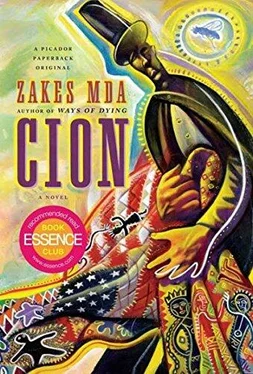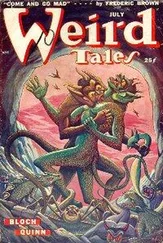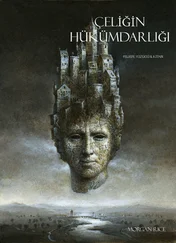“We know they’re here,” said Tobias.
“Yeah,” said another man. “Mr. Tobias can smell a fugitive nigger a mile away. That’s why he don’t need no dogs. He’s a bloodhound hisself.”
“There’s no one here,” said the stationmaster. “Just me and my wife.”
“And some parcel that Birdman deposited,” said Tobias. “Search the house!”
He knew already that there was a fat reward for the black boy and was eager to lay his paws on him. His men pushed the stationmaster aside and rushed into the house. “The basement,” shouted Tobias. “That’s where they gonna be.”
Nicodemus was not going to be captured without a fight. As the men rushed down the stairs he lunged at the first henchman and held his neck firmly in his grip. They rolled on the floor while Nicodemus pummeled the man’s face. At that time Abednego was lashing out with a broomstick, regretting the folly of giving the old hermit their musket. Nicodemus jumped to his feet and saw Tobias and the second henchman ready to pounce on him. He kicked the henchman on the floor very hard and was about to charge at Tobias when a shot rang. Nicodemus fell to the floor. Slowly the first henchman rose from the floor, with a smoking gun in his hand.
“You bastard!” screeched William Tobias. “You killed my five hundred big ones!”
Tobias drew his six-shooter and shot the first henchman. He and the second henchman fled and rode away on their horses, leaving their dead partner in the basement for the Underground Railroad people to worry about.

The story is told by the ghost trees that after the death of Nicodemus, Abednego found refuge in Tabler Town, long before the town changed its name to Kilvert. Nicodemus’s dying words were to urge his elder brother not to give up on their dream to follow the North Star to its conclusion, until he reached Canada. Abednego, however, decided not to proceed to Canaan, in order to be near his brother. After Birdman and the Quaker stationmaster left him in Tabler Town, he found solace in the floods that assumed a life of their own and gave him a feeling of security; in the sycamore trees whose hollow hearts hid beautiful secrets, like the heart of the tree outside his mother’s cabin; and in the sampler that constantly reminded him of the Abyssinian Queen singing to the sun.
He never got to know that the blue fly returned and hovered over her, and she died with a broad smile on her face.
And the sampler! Oh, the sampler! He would jealously guard it for it was the only memory of his brother that was left.
For the first time Abednego got to know the meaning of freedom among the tribes — the Shawnee and the Cherokee and the Powhatan — that lived side-by-side in the region. He learned about the God of the Shawnee, the Great Creator known as “Our Grandmother,” and paid his respects to Her, and gave his thanks for being brought to this beautiful place. Having been brought up by the graceful Abyssinian Queen, he found it comforting that the Creator was a woman. That was one thing the preachers of his Christian church that met in the Fairfield Farms big barn had failed to teach him.
He was not the only fugitive who found refuge among the tribes. The most famous was the one who gave his name to the town: Michael Tabler.
The ghost trees began Michael Tabler’s story at his father’s plantation in Ravenswood, Virginia, just across the Ohio River. Young Michael foolishly fell in love with his father’s slave, a willowy mulatto beauty called Hannah. The senior Tabler was determined to put to an abrupt stop all this madness, so he sold Hannah to some plantation far away from Ravenswood. But young Michael was just as determined that nothing would come between him and his love for Hannah. He searched for her until he found her, and then purchased her back from the new owner. He dared not take her back to his father’s plantation, so like many exiles before him he crossed the Ohio River and settled among the “Indian” tribes in Rome Township in the southeast of Ohio. He bought a piece of land, founding the village of Tabler Town, which later became known as Kilvert in its incarnation as a coal mining town.
Abednego befriended the Tablers and in later years their eleven sons, many of whom married local Native American women. He was also welcomed with open arms by a community of Africans who had settled there from Virginia over the years, some from as early as the late 1700s and others recent arrivals brought by the likes of Birdman and his fellow conductors of the Underground Railroad. Many of these Africans, all former slaves, intermarried with the Native Americans and with the Irish immigrants who had also received sanctuary in Tabler Town. A new race of people was founded.
Abednego learned that the Ottawa tribe of Ohio had a tradition of helping runaway slaves long before the Underground Railroad. So did the tribes of Rome Township. That was why he found so many black people. This confirmed some of the stories that the Abyssinian Queen used to tell about Africans who were welcomed by Native American tribes, some of them even becoming chiefs.
At first Abednego had great difficulty adapting to a life as a free man. For a long time there was a lot of anger in him at what had been done to his people. As a very light complexioned mulatto he was obsessed with blackening the race in defiance of those who had enslaved him and his mother. An Irish girl fell in love with him, but he was determined to fight against his own feelings for her, because he wanted to marry an African girl — as black as his mother. A woman who would tell stories of the old continent as the Abyssinian Queen used to do.
Love, however, had other plans for him. He fell in love with a Native American woman — the daughter of Harry Corbett, a Powhatan gentleman with vast orchards — and married her.
5. A Taliban in the House
Orpah is obsessed with ghost trees. That’s what these designs tell me. The trees feature in them in many forms. Fine detail of the mottled bark in shades of brown and gray and green and red and blue. And in black and white. Cracked branches and hollow trunks twisted in agony. Roots exposed above the earth. Knees bent in prayer. Trees in flight. Trees in dance. Trees caught in a whirlwind. Trees in a trance. White branches spreading on a black background like the web of a demented spider. Ghost trees in all shapes and sizes, often so stylized you wouldn’t know they were ghost trees. You wouldn’t know they were trees at all. You would just feel their power from the goosebumps that run amok all over your body. At least, that’s what they do to me. Damn that Orpah with her sitar! And now these designs; all executed in wax crayons by an adept but naive hand.
It’s been weeks since I retrieved them from the ghost tree and I can’t help but look at them every day. Before I sleep I take in every detail, and in the morning when I wake up I do the same. I have not told anyone about them. Once I thought I would talk to Orpah about them when I chanced upon her in the kitchen where she was making coffee for herself. But as soon as I entered she abruptly left, abandoning the boiling water on the stove. I went after her as she fled through the kitchen door and around the porch until she disappeared into a door that I later learned was another entrance to her room. They call it the mother-in-law room because of that entrance. I had not been aware it led to her room because there is another door that opens from the passageway into her room. I stood at the door and pleaded: “Please, Orpah, I mean you no harm. I just want to talk to you about something I found.”
She ignored me. I went back to the kitchen and removed the kettle from the stove. Perhaps, I thought, I should take the drawings back to the tree. And forget about them and their creator. But I couldn’t let myself do it then. I kept on postponing. Just one more time. Let me look at them one more time. I will return them to the tree tomorrow. Just one more time. Until today. This was my last attempt at having some form of communication with Orpah. I am not going to try again.
Читать дальше













